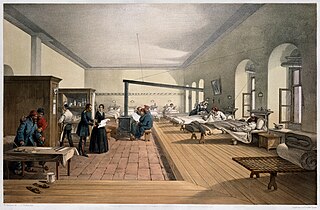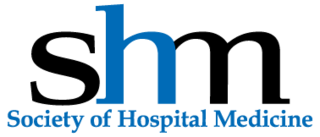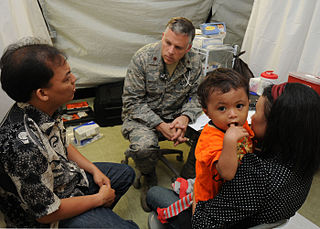Related Research Articles

Ronald Allen Williams is an American businessman, entrepreneur and management consultant, and board director on corporate, public sector and non-profit boards. Williams is the author of Learning to Lead: The Journey to Leading Yourself, Leading Others, and Leading an Organization, which appeared on The Wall Street Journal's best seller list. He is founder, chairman and CEO of RW2 Enterprises, LLC. He is the former chairman, president and chief executive officer (CEO) of Aetna Inc., a diversified benefits company. Aetna is now part of CVS Health.

A nurse practitioner (NP) is an advanced practice registered nurse and a type of mid-level practitioner. NPs are trained to assess patient needs, order and interpret diagnostic and laboratory tests, diagnose disease, formulate and prescribe medications and treatment plans. NP training covers basic disease prevention, coordination of care, and health promotion, but does not provide the depth of expertise needed to recognize more complex conditions.

The American Osteopathic Association (AOA) is the representative member organization for the more than 168,000 osteopathic medical doctors (D.O.s) and osteopathic medical students in the United States. The AOA is headquartered in Chicago, Illinois, and is involved in post-graduate training for osteopathic physicians. Beginning in 2015, it began accrediting post-graduate education as a committee within the Accreditation Council for Graduate Medical Education, creating a unified accreditation system for all DOs and MDs in the United States. The organization promotes public health, encourages academic scientific research, serves as the primary certifying body for D.O.s overseeing 18 certifying boards, and is the accrediting agency for osteopathic medical schools through its Commission on Osteopathic College Accreditation. As of October 2015, the AOA no longer owns the Healthcare Facilities Accreditation Program (HFAP), which accredited hospitals and other health care facilities.
A consultant pharmacist is a pharmacist who works as a consultant providing expert advice on clinical pharmacy, academic pharmacy or practice, public health pharmacy, industrial pharmacy, community pharmacy or practice, pharmaceutical analysis etc., regarding the safe use and production of medications or on the provision of pharmaceutical services to medical institutions, hospitals, universities, research institutions, medical practices and individual patients.

The Conference Board, Inc. is a 501(c)(3) non-profit business membership and research group organization. It counts over 1,000 public and private corporations and other organizations as members, encompassing 60 countries. The Conference Board convenes conferences and peer-learning groups, conducts economic and business management research, and publishes several widely tracked economic indicators.

Los Angeles County Department of Health Services operates the public hospitals and clinics in Los Angeles County, and is the United States' second largest municipal health system, after NYC Health + Hospitals.
A clinical nurse specialist (CNS) is an advanced practice nurse who can provide advice related to specific conditions or treatment pathways. According to the International Council of Nurses (ICN), an Advanced Practice Nurse is a registered nurse who has acquired the expert knowledge base, complex decision-making skills and clinical competencies for expanded practice, the characteristics of which are shaped by the context and/or country in which s/he is credentialed to practice. Clinical Nurse Specialists are registered nurses who have had graduate level nursing preparation at the master's or doctoral level as a CNS. They are clinical experts in evidence-based nursing practice within a specialty area, treating and managing the health concerns of patients and populations. The CNS specialty may be focused on individuals, populations, settings, type of care, type of problem, or diagnostic systems subspecialty. CNSs practice autonomously and integrate knowledge of disease and medical treatments into the assessment, diagnosis, and treatment of patients' illnesses. These nurses design, implement, and evaluate both patient–specific and population-based programs of care. CNSs provide leadership in the advanced practice of nursing to achieve quality and cost-effective patient outcomes as well as provide leadership of multidisciplinary groups in designing and implementing innovative alternative solutions that address system problems and/or patient care issues. In many jurisdictions, CNSs, as direct care providers, perform comprehensive health assessments, develop differential diagnoses, and may have prescriptive authority. Prescriptive authority allows them to provide pharmacologic and nonpharmacologic treatments and order diagnostic and laboratory tests in addressing and managing specialty health problems of patients and populations. CNSs serve as patient advocates, consultants, and researchers in various settings.
A Patient Safety Organization (PSO) is a group, institution, or association that improves medical care by reducing medical errors. Common functions of patient safety organizations are data collection and analysis, reporting, education, funding, and advocacy. A PSO differs from a Federally designed Patient Safety Organization (PSO), which provides health care providers in the U.S. privilege and confidentiality protections for efforts to improve patient safety and the quality of patient care delivery

Health administration, healthcare administration, healthcare management or hospital management is the field relating to leadership, management, and administration of public health systems, health care systems, hospitals, and hospital networks in all the primary, secondary, and tertiary sectors.
Maintenance of Certification (MOC) is a recently implemented and controversial process of physician certification maintenance through one of the 24 approved medical specialty boards of the American Board of Medical Specialties (ABMS) and the 18 approved medical specialty boards of the American Osteopathic Association (AOA). The MOC process is controversial within the medical community, with proponents claiming that it is a voluntary program that improves physician knowledge and demonstrates a commitment to lifelong learning. Critics claim that MOC is an expensive, burdensome, involuntary and clinically irrelevant process that has been created primarily as a money-making scheme for the ABMS and the AOA.

The Society of Hospital Medicine (SHM) is a membership society for hospitalists, physicians, and other caregivers who practice the specialty of hospital medicine.
The Chesapeake Regional Information System for our Patients (CRISP) is a nonprofit organization created to function as Maryland's state-designated health information exchange (HIE), by the Maryland Health Care Commission. CRISP currently serves as the HIE for Maryland and the District of Columbia. CRISP is advised by a wide range of stakeholders who are responsible for healthcare throughout the region.
Clinical peer review, also known as medical peer review is the process by which health care professionals, including those in nursing and pharmacy, evaluate each other's clinical performance. A discipline-specific process may be referenced accordingly.
An accountable care organization (ACO) is a healthcare organization that ties provider reimbursements to quality metrics and reductions in the cost of care. ACOs in the United States are formed from a group of coordinated health-care practitioners. They use alternative payment models, normally, capitation. The organization is accountable to patients and third-party payers for the quality, appropriateness and efficiency of the health care provided. According to the Centers for Medicare and Medicaid Services, an ACO is "an organization of health care practitioners that agrees to be accountable for the quality, cost, and overall care of Medicare beneficiaries who are enrolled in the traditional fee-for-service program who are assigned to it".

The Alliance of Independent Academic Medical Centers (AIAMC) is an American national membership organization of approximately 70 major academic medical centers and health systems committed to quality patient care, medical education and research. AIAMC members regard medical education and research as strategic assets in providing patient-centered care; operate independently of medical school ownership or governance while maintaining major medical school affiliations; care for a patient population that mirrors their local communities; and provide teaching and research that is innovative, applicable to practice and community responsive.
The National Center for Healthcare Leadership (NCHL) is an American 501(c)(3) nonprofit organization that promotes evidence-based best practices within the healthcare leadership, organizational development, and international healthcare spaces. Its mission is dedicated to advancing healthcare leadership and organizational excellence by building diverse, inclusive, and collaborative relationships in the US and abroad. NCHL operates three organizational membership programs – the Leadership Excellence Networks (LENS), the National Council on Administrative Fellowships (NCAF), and the US Cooperative for International Patient Programs (USCIPP) – that in total comprise over 130 US hospitals and health systems and nearly 40 graduate health management programs at US institutions.
The Center for Personalized Education for Physicians (CPEP) is a non-profit organization, headquartered in Denver, Colorado, and it specializes in physician competency assessment and educational intervention. The organization was established in 1990 as a collaborative effort of seven Colorado healthcare organizations: the Colorado Alliance for CME, the Colorado Foundation for Medical Care, the Colorado Hospital Association, the Colorado Medical Society, the Colorado Physician Health Program, the Colorado Society of Osteopathic Medicine and the University of Colorado School of Medicine.
Health care quality is a level of value provided by any health care resource, as determined by some measurement. As with quality in other fields, it is an assessment of whether something is good enough and whether it is suitable for its purpose. The goal of health care is to provide medical resources of high quality to all who need them; that is, to ensure good quality of life, cure illnesses when possible, to extend life expectancy, and so on. Researchers use a variety of quality measures to attempt to determine health care quality, including counts of a therapy's reduction or lessening of diseases identified by medical diagnosis, a decrease in the number of risk factors which people have following preventive care, or a survey of health indicators in a population who are accessing certain kinds of care.

Cultural competence in healthcare refers to the ability for healthcare professionals to demonstrate cultural competence toward patients with diverse values, beliefs, and feelings. This process includes consideration of the individual social, cultural, and psychological needs of patients for effective cross-cultural communication with their health care providers. The goal of cultural competence in health care is to reduce health disparities and to provide optimal care to patients regardless of their race, gender, ethnic background, native languages spoken, and religious or cultural beliefs. Cultural competency training is important in health care fields where human interaction is common, including medicine, nursing, allied health, mental health, social work, pharmacy, oral health, and public health fields.
Credentialing is the process of establishing the qualifications of licensed medical professionals and assessing their background and legitimacy.
References
- ↑ Center for Healthcare Governance - About Us
- ↑ Fast Facts on US Hospitals
- ↑ Douglas K. Anning; Fredric J. Entin; Mary K. Totten (December 1, 2009). "The Guide to Good Governance for Hospital Boards="Center for Healthcare Governance"": 5.
{{cite journal}}: Cite journal requires|journal=(help) - ↑ Donald C. Wegmiller; Jeffery Alexander; Henry Altman; Frank Alvarez; David Benfer; Howard Berman; Christine Cassel; Dennis Colling; John Combes; Robert DeVries; Carol Emmott; Kevin M. Fickenscher; Daniel M. Fox; Merrill Gappmayer; Douglas D. Hawthorne; Kathryn J. McDonagh; James E. Orlikoff; Mary Pittman; Lorraine Pruitt; Lawrence Prybil; Edward F. Reifsnyder; Tom Sadvary; Nancy Schlichting; Timothy Stack; Richard Umbdenstock (February 1, 2007). "Building an Exceptional Board: Effective Procatices for Health Care Governance". Center for Healthcare Governance: 5–7.
{{cite journal}}: Cite journal requires|journal=(help) - ↑ John Combes; Kathryn J. McDonagh; James E. Orlikoff; Joel Allison; Craig A. Becker; Stacy Cantu; Vincent C. Caponi; Connie R. Curran; Richard P. de Filippi; Daniel Gutierrez; Frederick A. Hessler; Thomasine Kennedy; Lanny Kope; Kimberly McNally; David Nygren; Marie J. Sinioris; Mark Stavish (February 1, 2009). "Competency-Based Governance: A Foundation for Board and Organizational Effectiveness". Center for Healthcare Governance: 7–10.
{{cite journal}}: Cite journal requires|journal=(help)